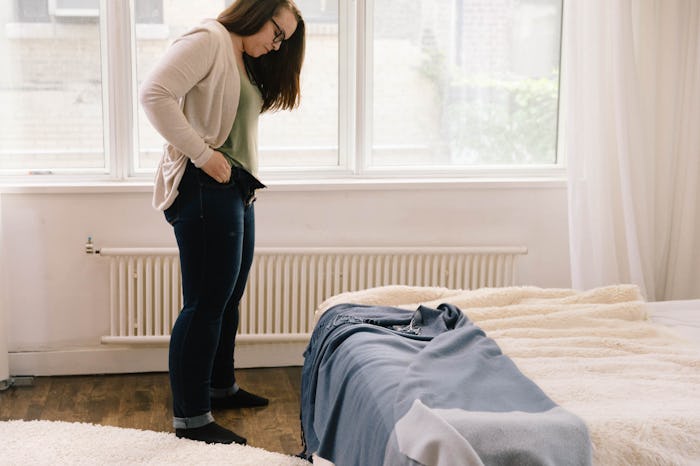At the beginning of all three of my pregnancies I have been anxious to start showing quickly. After all, if I've got this good news going on, I want everyone to know it, and I'm of the mind that there is nothing quite as beautiful as a woman with a belly bump. But on the other hand, I have friends who don't want to show too soon because they prefer to wait until the second trimester to announce the pregnancy to family and friends, and I respect that, too. So when do most women start showing during pregnancy? There's a wide spectrum.
Romper spoke with Margaret Buxton, Certified Nurse Midwife at baby+co, a network of women's health and wellness centers, and she says you may notice your sweet bump earlier than you think. "Mommies-to-be can start to see a little bump as early as the end of their first trimester," Buxton explains. "However, there are some women who will not start to show until the second trimester. This is not something to be concerned about. From weeks 13 to 20, women should expect to notice a bump."
A seven-week window is certainly a broad range, but the factors at play are many. One consideration is whether this is your first pregnancy or not, as Buxton explains that "Moms having their first baby take longer to show, and those having their second or beyond often show sooner."
Body type also comes in to play here as taller women show later, as do even shorter women with long torsos, and those with deeper pelvises. And of course, women carrying more than one baby will most likely develop a baby bump earlier.
To elaborate on why body type matters, Buxton explains that more vertical space allows the baby to stretch out, which means a less prominent bump. She goes on to mention, "If you are carrying weight more in your abdomen, that also contributes to a different size and shape to your bump." So while shorter women like me will look visibly pregnant 10 sneezes after conception, my tall friends (or those with naturally heavier body structures) can keep the secret much longer.
But it's not just your physical build that can affect when strangers will want to start rubbing your belly. Factors such as BMI, metabolism, and even gas can can make your bump look bigger for awhile, and you may notice a bit of fluctuation from day to day.
But generally speaking, after the first trimester, things speed up for the majority of women. According to Buxton, after week 13, women typically gain an average of almost a pound a week, so the bump will gradually make itself known. "Every pregnancy is different, so while the weeks above are typical for most women, we need to keep in mind that this is a generalization."
So should you be worried if you're still not showing, say, halfway through your second trimester? Not unless your healthcare provider has other reasons to be concerned. Buxton explains that part of routine prenatal care is monitoring growth and development of the baby, and one of the ways that is done is by measuring the bump at every visit. If your OB-GYN or midwife is concerned about your baby's growth, an ultrasound will be ordered.
Buxton emphasizes that comparing yourself to other women has never turned out well for anyone. "Women should not worry if they start showing earlier or later," she says. "Each pregnancy is different, so each person will experience different times of when their bump will show. Just remember, the person in line at the post office who comments on your pregnant belly is not an expert."
Amen to that. Now will someone please pass them that memo?
Check out Romper's new video series, Romper's Doula Diaries:
Check out the entire Romper's Doula Diaries series and other videos on Facebook and the Bustle app across Apple TV, Roku, and Amazon Fire TV.
